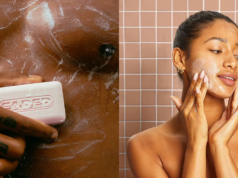TBH, it seems like every other day there’s a new skincare ingredient blowing up my IG feed. And, hey, I’m not entirely mad about it—especially since a lot of them (hi, sweet almond oil) are packed with legit benefits. The latest ingredient I’m seeing basically everywhere right now? Emu oil, which has been used in Aboriginal culture for centuries and is loved for its ability to deeply hydrate, soften, and soothe the skin.
It’s a tad unconventional (more on that in a bit) but I can’t not do a deep dive to figure out if (and why!) it’s worth adding to your routine. Ahead, four dermatologists weigh in on everything there is to know about emu oil, including its exact benefits, the skin types it agrees with most, and so much more.
First things first: Emu oil is derived from the fat of emu birds, which are large flightless birds that are native to Australia. “Long ago, emu oil was used by Aboriginal culture for wound healing and other skin conditions—like eczema, psoriasis, and dermatitis—as well as a health tonic for digestive issues,” says dermatologist Ava Shamban, MD, founder of Ava MD and SkinFive. In 2021, Dr. Shamban says you can find emu oil on the shelves of your local pharmacy in straight oil form—although it’s also a popular ingredient in soaps, oral supplements, moisturizers, and ointments.
Because of its ability to quickly absorb into the skin (its smaller particles are to thank for that!), emu oil basically acts as a magnet to help keep your skin moisturized and baby soft. “Emu oil is rich in omega fatty acids, oleic acid, and antioxidants,” explains dermatologist Corey L. Hartman, MD, founder of Skin Wellness Dermatology in Birmingham, so it’s great for soothing inflammation, hydrating the skin, and helping prevent damage from free radicals and other pollutants.
But even though the benefits are vast, emu oil isn’t exactly for everyone. According to Dr. Shamban, it comes from the belly and back fat (or other fatty deposits) of deceased emu birds, meaning it’s not a cruelty-free ingredient. If that doesn’t exactly sound like your cup of tea, I get it, and don’t worry—emu oil is by no means the end-all be-all key to good skin. There are many cruelty-free face oils out there with equally hydrating benefits, like sweet almond or grapeseed, just to name a couple.
The primary function of emu oil is adding moisture to dry, dehydrated skin. “With topical use, emu oil can hydrate the skin, reduce signs of aging, support collagen production, reduce inflammation, and help minimize damage from external aggressors,” says dermatologist Dendy Engelman, MD, Mohs surgeon at Shafer Clinic.
Hydrating benefits aside, Dr. Hartman mentions that its heavy dose of antioxidants can also help stimulate collagen production and reduce early signs of aging—like fine lines and wrinkles. And, according to Dr. Shamban, emu oil is also believed to support wound healing and provide some relief to patients who suffer from arthritis. I mean, get you an ingredient that can do it all, right?
The benefits don’t stop with your skin, FYI—you can also take it orally in capsule form. “When taken orally, emu oil can help lower cholesterol and aid in hair and nail growth, due to its high levels of omega fatty acids,” says Dr. Engelman. That said, emu oil isn’t exactly unique in this respect, says Dr. Engelman, and there are many alternatives (like biotin, omega-3, and niacin) that’ll help you achieve the same results.
Emu oil is safe to use on most skin types, but Dr. Hartman says it’s most beneficial for those dealing with dry or inflamed skin that’s in need of hydration. That means folks with psoriasis, eczema, and atopic dermatitis are great candidates too (although it’s always a good idea to chat with your dermatologist before you add an-y-thing to your routine if you’re worried about the risk of irritation).
Quick heads up though: Because of it’s thick, oily consistency, emu oil isn’t a great option for acne-prone or oily skin (non-comedogenic oils, like argan, are generally safer options). Others who should reconsider adding emu oil to their skincare routine? “Anyone who has skin sensitivities or allergies to animals,” says dermatologist Tracy Evans, MD, medical director of Pacific Skin and Cosmetic Dermatology.
Generally speaking, emu oil is a fairly safe ingredient with minimal side effects. But one more time for the ppl in the back: It’s thick consistency means anyone with oily or acne-prone skin should stay away from emu oil, since it definitely has the potential to clog your pores or break you out. And as with any new product, it’s never a bad idea to start with a patch test before you slather it all over your face (better safe than sorry, right?).
You’ve got options when it comes to application, but the most common method is using emu oil is a sealant (aka the final step in your skincare routine, after your cleansers, serums, treatments, and moisturizers) to help lock in hydration. Dr. Engelman says you can apply it directly to your skin (start with just a couple drops, only adding more if/when you need it) or you can mix it into your favorite face cream. Since it has a thicker consistency, Dr. Engelman suggests applying it only once a day (in the a.m. or p.m.) to avoid clogging your pores.
Hot tip: Dr. Shamban says emu oil is also an excellent addition to eye creams. “It’s very good when combined with caffeine or vitamin K—among other ingredients—in eye creams,” she explains. Just add a drop or two to your go-to formula, mix well, and massage it into your skin.
If you’re looking to hydrate, soften, and soothe your skin, you can definitely try experimenting with emu oil. Just know that it’s not a cruelty-free ingredient (remember: you’ve got other options if that’s a nonstarter for you!) and is generally too heavy for acne-prone skin. For the right person though, emu oil is a v effective hydrator that’s super easy to apply.









